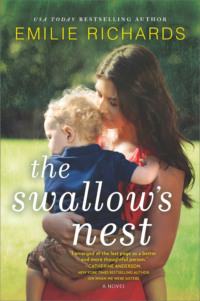Kitap dosya olarak indirilemez ancak uygulamamız üzerinden veya online olarak web sitemizden okunabilir.
Kitabı oku: «The Swallow's Nest»
Three women fight for the chance to raise the child they’ve all come to love
When Lilia Swallow’s husband, Graham, goes into remission after a challenging year of treatment for lymphoma, the home and lifestyle blogger throws a party. Their best friends and colleagues attend to celebrate his recovery, but just as the party is in full swing, a new guest arrives. She presents Lilia with a beautiful baby boy, and vanishes.
Toby is Graham’s darkest secret—his son, conceived in a moment of despair. Lilia is utterly unprepared for the betrayal the baby represents, and perhaps more so for the love she begins to feel once her shock subsides. Now this unasked-for precious gift becomes a life changer for three women: Lilia, who takes him into her home and heart; Marina, who bore and abandoned him until circumstance and grief changed her mind; and Ellen, who sees in him a chance to correct the mistakes she made with her own son, Toby’s father.
A custody battle begins, and each would-be mother must examine her heart, confront her choices and weigh her dreams against the fate of one vulnerable little boy. Each woman will redefine family, belonging and love—and the results will alter the course of not only their lives, but also the lives of everyone they care for.
Praise for the novels of Emilie Richards
“I emerged at the last page as a better and more thoughtful person.”
—Catherine Anderson, New York Times bestselling author, on When We Were Sisters
“Straightforward, honest, and uplifting.”
—New York Journal of Books on When We Were Sisters
“Emilie Richards is at the top of her game in this richly rewarding tale of love and family and the ties that bind us all. One Mountain Away is everything I want in a novel and more. A must-buy!”
—Barbara Bretton, New York Times bestselling author
“Richards creates a heart-wrenching atmosphere that slowly builds to the final pages, and continues to echo after the book is finished.”
—Publishers Weekly on One Mountain Away
“This is emotional, suspenseful drama filled with hope and love.”
—Library Journal on No River Too Wide
“Portraying the uncomfortable subject of domestic abuse with unflinching thoroughness and tender understanding...offers important insights into a far too prevalent social problem.”
—Booklist on No River Too Wide
“A juicy, sprawling beach read with a suspenseful twist.”
—Publishers Weekly on Fortunate Harbor
“A multi-layered plot, vivid descriptions and a keen sense of place and time.”
—Library Journal on Rising Tides
“Richards’s ability to portray compelling characters who grapple with challenging family issues is laudable, and this well-crafted tale should score well with fans of Luanne Rice and Kristin Hannah.”
—Publishers Weekly on Fox River, starred review
The Swallow’s Nest
Emilie Richards

To Jessie, my daughter, who has been and always will be a great joy in my life. Thanks for insisting I watch Maleficent.
Contents
Cover
Back Cover Text
Praise
Title Page
Dedication
PART I
Chapter 1
Chapter 2
Chapter 3
Chapter 4
Chapter 5
Chapter 6
Chapter 7
Chapter 8
Chapter 9
Chapter 10
Chapter 11
PART II
Chapter 12
Chapter 13
Chapter 14
Chapter 15
Chapter 16
PART III
Chapter 17
Chapter 18
Chapter 19
PART IV
Chapter 20
Chapter 21
Chapter 22
Chapter 23
Chapter 24
Chapter 25
Chapter 26
PART V
Chapter 27
Chapter 28
Chapter 29
Chapter 30
Chapter 31
Chapter 32
Chapter 33
Chapter 34
Chapter 35
Chapter 36
Chapter 37
Chapter 38
Chapter 39
Chapter 40
Chapter 41
Chapter 42
Chapter 43
Chapter 44
Chapter 45
Chapter 46
Chapter 47
Acknowledgments
The Swallow’s Nest Reader’s Guide
Questions for Discussion
Extract
Copyright

PART I
Choosing the right colony is the first of many tasks for Petrochelidon pyrrhonota, the cliff Swallow. As primary homemaker the female investigates existing colonies before she decides where she and her mate should reside.
Male and female build a nest and raise their young together, but sometimes both mate with others, too.
“Our Songbirds, Ourselves: A Tale of Two Species,” from the editors of Ornithology Today.
1

Feathering your nest with imagination and love
MARCH 3RD:
All of you know how I’ve longed for this day. One year ago, my husband, Graham, was diagnosed with Burkitt’s lymphoma. You’ve been with me as he progressed through treatment, as our spirits soared and plummeted, even with me during my absences here. I can’t count the encouraging emails I’ve received, the suggestions, the promises of prayers. Now, today, we will celebrate the best possible news. Graham’s cancer is in remission, and he is really, at last, on the road to recovery.
Before this I never considered how I would adjust to news as horrifying as a cancer diagnosis, but now, one year later, I know. Life moves on and so do we. Graham and I came through this year stronger and closer, and my gratitude for your support knows no bounds. Mahalo, the Hawaiian word for thank you, doesn’t begin to cover what I’m feeling today.
I wish you could be right here to share every moment of today’s celebration party with us, but watch for photos and recipes. In the meantime, here are the instructions for welcoming a loved one with a flip-flop sign—or “slippahs” as we call them in my home state.
Aloha! Lilia
Lilia Swallow was on speaking terms with reality, but only just. For the past year she had questioned everything she believed in, while trying to make sense of the disasters raining down from above, the way Haimi, the yellow Lab of her childhood, had pawed and rattled coconuts when they fell from palm trees in her family’s yard on Kauai. In the end, unlike Haimi, she had concluded that while life often hides something delicious, too often the best parts remain out of sight and unattainable.
“And Haimi never once cracked a coconut.”
Regan Donnelly was looking on as Lilia painstakingly shot photos of a moisture-beaded glass pitcher nearly overflowing with pineapple chunks, citrus slices and a haze of red wine floating on top of white. At Lilia’s words her friend cocked her head. “What on earth are you talking about?”
Lilia hadn’t realized she’d spoken—or more accurately, mumbled. She had begun talking to herself during the long stretches when her husband was in the hospital. She had been so lonely, she had needed the sound of her own voice.
“Nothing. I was just thinking about happy endings and failures.”
Regan sing-songed in a high-pitched voice. “Lily-ah, Lily-ah, you are being Silly-ah!” She grinned. “Today is your happy ending.”
“I wish I’d never told you my brothers used to say that.”
“But you did.”
Lilia straightened and stretched before she moved the pitcher to the back of the counter where sun from a large window over the sink wouldn’t strike it quite so directly. She turned the handle to one side and took another shot.
“Well, if nothing else, my pineapple sangria is a happy ending. I worked on and off for a week on this recipe. I think you’ll like it. My readers will, too.”
Regan would not be deterred. “Graham’s in remission. His last two CT scans were clear. You’re afraid to be happy, aren’t you? You’re afraid the gods will descend and whack you all over again.”
Lilia sent her just the faintest smile, because as different as they were, Regan knew her inside and out. Although they were the same five foot five and both twenty-eight, Regan was fair-skinned with a collar-length bob the color of butterscotch. Her pale green eyes had been Lilia’s inspiration the last time she had painted this kitchen. In contrast Lilia’s hair was nearly black and waved down her back, and her skin turned a distinctive brown in the sun. She had what novelists liked to describe as “almond eyes,” in her case the color of almonds, although the crease of her eyelids also hinted at whatever Asian ancestor had bequeathed them to her.
She decided the pitcher had finished its moment in the spotlight and stepped away. “I come from superstitious people. This morning I blogged about how happy I am. I don’t want to jinx Graham’s recovery.”
“We Irish can match you Hawaiians, superstition for superstition. But I think you’re allowed to be happy. His doctor told you relapses occur quickly, right? It’s been a year since the initial cancer diagnosis, but he’s here today, having a great time.”
It had been a year marked by nearly insurmountable hills and valleys. Lilia was still too exhausted not to question fate.
“My tutu trotted out an old Hawaiian proverb whenever things went wrong. ‘He ihona, he pi’ina, he kaolo.’ It means we go down, we go up, we walk on a level road. A level road is all I’m asking for. Graham, too.”
“He’s looking so much better. Hair’s appealing on a man, don’t you think?”
Lilia allowed herself to laugh. “We weren’t sure what color it would be after chemo, but I think it looks the way it did before he lost it, only shorter.”
Graham, dark blond hair a couple of inches now, was standing outside their sunroom door with newly arrived partygoers, receiving good wishes. Employees and clients from Encompass Construction, the design-build firm he had created from the ground up, were shoulder to shoulder with neighbors, college friends and some of Lilia’s clients, too. But in the middle of a conversation with another young man, he stopped and turned, looking straight at her, as if he knew she was talking about him. Then he smiled.
For a moment she fell back in time to the first day Graham Randolph had smiled at her. She’d been ten; he’d been eleven. She’d been barefoot, and he’d worn stiff leather loafers with heavy dark socks. Until that moment she’d written him off as sullen and self-absorbed. Then she fell in his swimming pool trying to make an impossible Frisbee catch.
Remembering that now she winked at him, and his smile widened before he turned away.
Graham, even after months of chemotherapy, after losing all his hair and almost twenty pounds, was still easy on the eye. He was handsome in a prep school way, even though he was still puffy from steroids and sported nearly invisible chemo ports in his chest and scalp. Once again his blue-gray eyes were rimmed with dark lashes shaded by darker brows. Despite his illness he was still broad-shouldered and narrow-hipped, and today, as usual, he was clad in scruffy jeans and a T-shirt—the more or less official dress of the Silicon Valley.
Best of all he was alive and hers.
“Do you ever get tired of this?” Regan swept a manicured hand at the pitcher and at a platter of hot and sour wings that Lilia had photographed first. The wings weren’t quite finished, but sometimes food photographed best when it was still slick with sauce that later would darken in the oven.
Lilia set down her camera so she could slide the wings back to a foil-lined baking sheet. “As much as I’d like to forget my website this once, I don’t have the luxury. These days my online presence is the largest portion of our income.”
“Didn’t readership grow during Graham’s illness?”
The larger audience had surprised Lilia, but so many people had hung on every word she’d carefully crafted about Graham’s illness. Prayers had been said all over the world. Uplifting emails had flooded her in-box.
“It did grow, but now my readers want a celebration after a year of gloom.”
Regan was still piling up the happy endings. “The Swallow’s Nest will be even busier and more productive now that you won’t be at the hospital so much.”
The Swallow’s Nest had been named after the Tudor Revival cottage in San Jose, California, where they stood. Lilia’s aunt Alea Swallow had always called the house “my nest” and, on her death, had bequeathed it to her niece, who had taken care of her at the end of her life. Now Lilia’s website and blog were devoted to nesting, to creating a snug, beautiful home in a small space like this one, to feeding loved ones and launching fledglings.
That last, of course, was something she wouldn’t be doing, at least not for some time.
She closed the oven door, setting a timer with her voice. At that moment Carrick Donnelly, who’d circled the house to the patio, abandoned his date and came inside through the sunroom, bending over when he reached Lilia to kiss her cheek.
Carrick and Graham had been friends since childhood, and Lilia had known him almost as long as she’d known her husband. He might be Regan’s older brother, but in the sunshine there was only a faint tinge of red in his brown curls, and his eyes were a much deeper and muddier green. He was also as different from Lilia’s husband as the ocean from the shore, lankier and less patrician, but equally as pleasurable to look at.
For just a moment he rested his hands on her shoulders. “Anything you need help with?”
“No, you ought to get back to Julie.” Lilia hoped she had his date’s name right. She’d met the woman once, another associate at Carrick’s Palo Alto law firm, but keeping up with the names of his ever-changing girlfriends wasn’t easy.
“She’s already engrossed in a bitcoin discussion with somebody from Google. She’ll never realize I’m not standing beside her.”
She held out the sangria. “Would you take this outside and put it with the other pitchers and check to see if there’s enough beer and soft drinks in the ice chest? I have plenty in the fridge if there’s not.”
He reached for a dish towel and wrapped it around the bottom of the pitcher where moisture was beading. Unlike the man she’d married, who had grown up with housekeepers and maids, Carrick and Regan had grown up in a family where everybody pitched in.
He inclined his head toward the patio. “Graham looks happy.”
“I invited everybody he loves.”
His expression changed to something less pleasant. “His mother?”
“I did ask Ellen. She sent her regrets.”
“She’s capable of regret?”
This was so unlike him, a man who always struggled to be impartial, that Lilia didn’t know what to say.
He shrugged. “I’ll see about the drinks.”
Regan waited until her brother had gone. “He won’t tell you, but he called Ellen when Graham was first diagnosed. He told her she needed to make peace with her son because if she didn’t, and Graham died, she would regret it forever.”
Carrick hadn’t told Lilia, but he wouldn’t have. She’d had enough on her plate. “Carrick was a guest in their house for a lot of years. He knows Graham’s parents better than I do. I guess he was in a better position to plead with them.”
Of course Carrick hadn’t bothered to speak to Graham’s father. Like any lawyer he understood lost causes.
“Plead probably isn’t the right word,” Regan said. “I think he told her straight out.”
“Maybe the phone call worked. Ellen did visit the hospital at least once. I was there.”
“How did that go?”
Lilia could still see the scene in her mind. Illness hadn’t rested well on Graham’s shoulders. Depression was part of cancer, for reasons nobody had to explain, and too often he had shut out the people who loved him when they tried to help. That morning she had prayed his mother’s visit might turn the tide.
She tried to describe it. “When she walked in and asked Graham how he was feeling, she wrapped her fingers through a long strand of pearls and twisted them back and forth, until I was sure they were going to explode all over the floor. Maybe she wanted me to scoop up a few to help with the hospital bills.”
“Casting pearls before swine?”
Lilia hoped not. “She stayed about five minutes. Then she told me Graham needed his rest and offered to walk me to my car.”
“Did she have something she wanted to tell you?”
“I’ll never know. He needed support more than he needed rest, and she knows our phone number.”
“Well, look at all the people who are here to celebrate.”
Lilia could see the backyard, and in the other direction, all the way through their dining area to the living room. More guests had just let themselves in through the front door. From the looks of things, everybody she had invited might be coming.
“You go and mingle. When they’re ready I’ll take the wings out of the oven and put them on a platter,” Regan said.
Lilia nodded to two sheets of quinoa-stuffed mushrooms she’d made for their vegan friends and already photographed. “Great. And would you put the mushrooms in once the wings are out? I’ll get them when I come back through.”
“Done. Go say hi.”
Outside, the welcome sign she had crafted from spray-painted flip-flops hung from a tree, and three surfboard tables Graham had created from replicas that had once hung outside a surf shop were already groaning with food.
For the past year, instead of enjoying leisurely nutritious meals, Lilia had eaten vaguely edible items packaged in cellophane. Convenience store sandwiches with sketchy expiration dates, salt and vinegar potato chips and cartons of yogurt had been staples. Today she had been too happy to stop cooking. But even if the wings flew away and the mushrooms formed a fairy circle behind the garage, the party would still be a knockout. Relief and joy scented the air.
Guests she hadn’t yet spoken to came to say hello. She greeted them with “Aloha,” and a hug, the way she always did, an expected ritual for those who had been here before. She warned first-time guests they might see her taking photos for her website, and if they didn’t want to be in a shot, to let her know. The Hawaiian sangria and the wings would probably be featured this week.
Carrick, who shared Graham’s taste in music, had put together a playlist of songs about fresh starts and homecomings. By the time Lilia got back to the kitchen to arrange the stuffed mushrooms on a platter, the music was so loud that Graham was able to sneak up behind her. He wrapped his arms around her waist without warning.
“Another awesome party,” he shouted.
“An awesome reason to have one.” She set the tray on a nearby counter and turned in his arms to kiss him. “You need to eat, Pilikua.”
He brushed a strand of hair over her shoulder, and his fingertips lingered against her neck. She was wearing a turquoise sundress he loved, but it was the neckline he loved most, just low enough to hint at everything it hid. He liked the way the fabric cupped her breasts, or had before she’d lost so much weight. She hoped the dress would fit perfectly again very soon.
“You okay? Not too tired?” she asked.
He kissed her again. “Flying high.”
He looked happy enough, but pale. The scans might be clear, but there had been so many side effects from the disease and the treatment that he was far from recovered. He had spent two mornings of the past week on his latest job site, and both afternoons he’d fallen into bed, so exhausted he hadn’t even taken off his shoes.
Over the hubbub she heard more music, this time guitar chords from the front of the house. Last year Graham had replaced their old doorbell with a programmable one. When Carrick had dropped by yesterday with his playlist, he had uploaded the opening riffs of Steely Dan’s “Home at Last.”
She would probably blog Carrick’s playlist next week.
“I’ll get the door.” She was surprised whoever was standing on the porch hadn’t walked right in. Clearly the party was underway. “You get something to eat, okay? I’ll send the stragglers along to greet you.”
As she went to answer the door, she glanced back and smiled as, outside, he draped his arm over the shoulders of his master plumber, who was politely examining the sangria. Graham pointed the heavily tattooed man toward an ice chest filled with beer.
The front of the house had a slight entry alcove framed in by a narrow bookshelf. Over the past three years as Graham renovated the cottage, she had refused to let him incorporate that space, with its coat closet, boot tray and umbrella stand, into the rest of the living room. She liked the idea of a transition from the porch, a chance for guests to catch a breath, like actors waiting and preparing in the wings for their next big scene.
Stepping into the alcove she opened the door, preparing to prop it open for the rest of the afternoon.
A moment passed before she recognized the woman clad in tight jeans, showy metallic platforms and a formfitting black tank top. Marina Tate, a leggy and unashamedly voluptuous blonde, was an outside sales rep for a supply company Graham worked with. He had introduced them at some company function, and now she remembered that Marina had been to a party here. She tried to think when. Sometime before the world had caved in.
Lilia hadn’t invited her today, but she guessed Graham must have.
She was glad that with everything else going on she remembered the other woman’s name. “Marina, right?” She smiled. “Aloha. It’s nice to see you.”
Something stirred in Marina’s arms. Lilia glanced down, noting several canvas bags at her feet before her gaze lifted to the bundle resting against the woman’s chest. For a moment she fumbled for something to say, coming up with the blatantly obvious. “A baby.” She leaned over, searching her memory for a husband, boyfriend or even a lover. “He’s adorable. How old is he? She?” She looked up in question.
“Toby is three months.” Marina didn’t sound happy, and certainly not like a doting mother. Most of Lilia’s friends with children answered the same question in weeks and days.
She tried a second time for a better look so she could say something complimentary. “I’m so sorry. I didn’t even know you were pregnant. I would have—”
Marina cut her off. “I doubt you would have. And whether you found out about the pregnancy wasn’t up to me.”
The baby seemed to be asleep, and Lilia couldn’t get a good look because, despite moderate temperatures, he was swathed in blankets. She stepped back and met the other woman’s eyes. Marina’s expression was as hostile as her tone.
She searched for the cause. “I hope you know he’s welcome at the party. There aren’t any other children, but he’s really too young to need a playmate, isn’t he?”
“I don’t think he’ll be welcome, Lilia. But here he is.” Marina held out her arms. “Let’s just see.”
Lilia felt her smile disappear. She had no idea what she was expected to do. “I’d love to hold him, but I’m still taking food out of the oven—”
“You’ll get used to that. Wanting to do other things and not being able to.”
Now she was completely at sea. This time she said nothing. The conversation obviously belonged to Marina.
“Take him.” Marina lifted the bundled baby higher. He whimpered, beginning to wake, but Lilia shifted her weight back and away.
“Take him!”
Lilia knew better than to let this continue. “Let me get Graham, or maybe I can call somebody else for you?”
“You know, I’m glad it worked out this way. I’m glad you were the one to answer the door.”
Lilia stepped back, preparing to slip inside, but Marina tucked the baby against her own chest and grabbed Lilia’s arm with her other hand to stop her. “Take him.”
The baby’s name finally registered. “Toby?”
“Toby. Right. Toby Randolph. After his father. Don’t you think a boy should carry on the family name? Tobias is Graham’s middle name, right?”
Lilia managed another step back, trying to shake off the other woman’s hand, but with no success. “You need to leave right now.”
“Oh, I’m leaving. But I’m leaving Toby here when I go. With you. With his father. I’ve finished my part of this bargain. Now it’s up to Graham to take care of the rest.”
She thrust the blanketed bundle forward so forcefully that Lilia grabbed at it. She had no choice, panicked that Marina would let go and blame the resulting disaster on her.
Satisfied, Marina stepped back and dropped Lilia’s arm. “You’ll have lots of time to think about this moment and what a horrible person I am. But while you’re at it, don’t forget, I gave this baby life. Think about that, Lilia, when you’re feeling superior. I did something you couldn’t be bothered to do. And think about what it was like for me to manage everything on my own up to this point, when I was promised so much more.”
She didn’t glance down at her son for a final goodbye. She turned and walked along the flowered brick pathway to the street. She was out of sight almost before Lilia could form another thought.
In her arms the baby stirred. Stunned, Lilia looked down, and the tiny infant opened eyes the china blue of her husband’s. With shaking fingers she pulled back the blanket. What hair the baby had was blond, like Graham’s. But Marina was blond, and surely her eyes were blue, as well.
This was a scam, a horrible, ill-advised prank.
She lifted him slowly for a better view, and then, without a legal document, without confirmation from anyone except a crazy woman, with no proof whatsoever except a vague resemblance that might not even exist, she was 100 percent certain this was no scam.
This child belonged to her husband.
She wanted to drop the bundle and run. She wanted to race after the near-stranger who had just handed off her beautiful baby like a football in play.
But most of all? She wanted to scream right along with Graham’s son, who was now wailing inconsolably in her arms.








